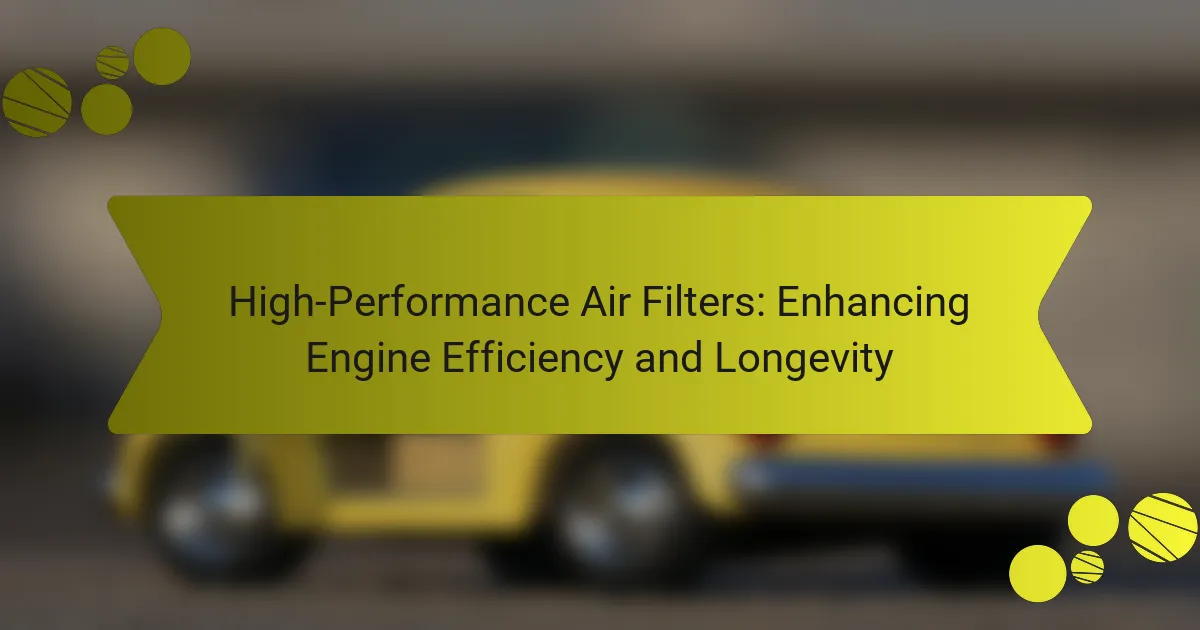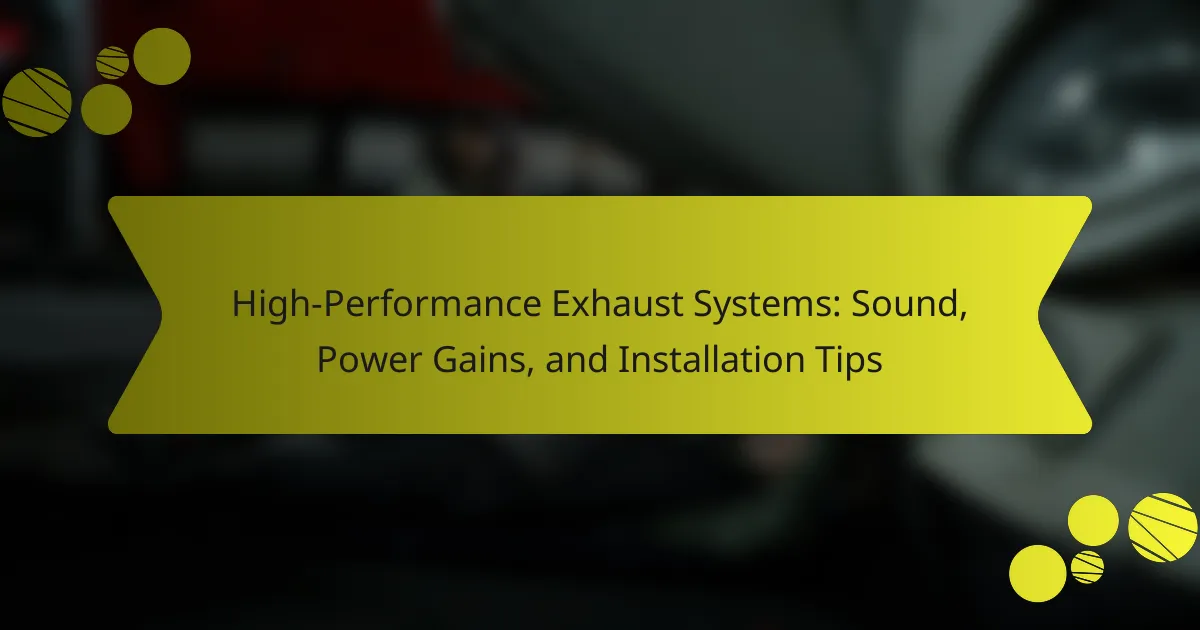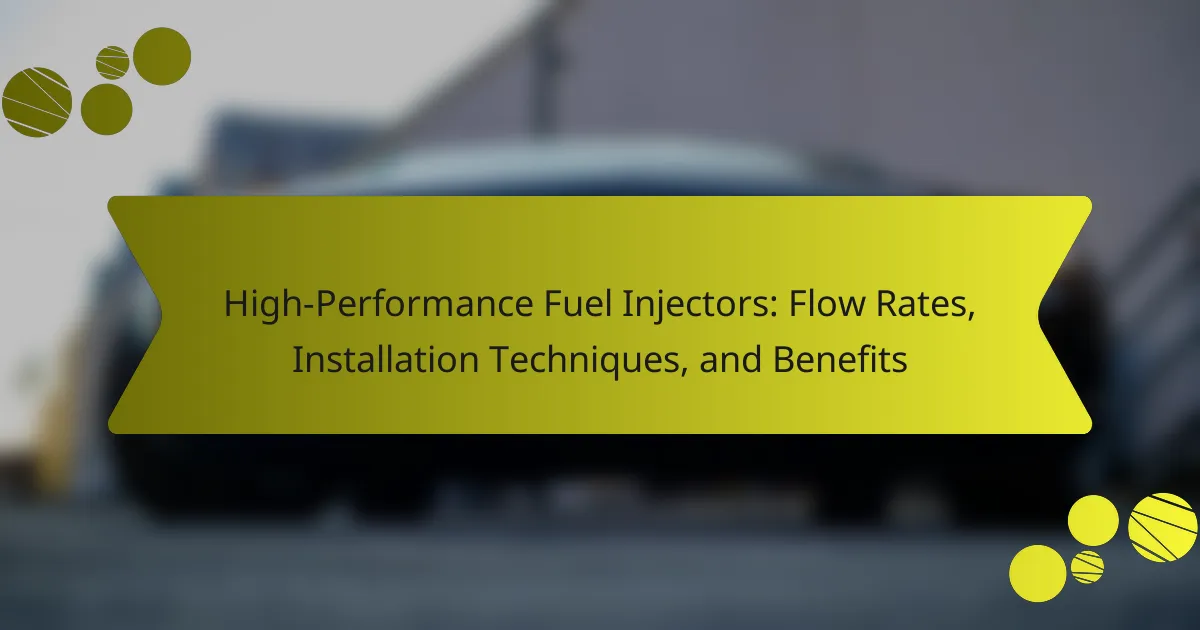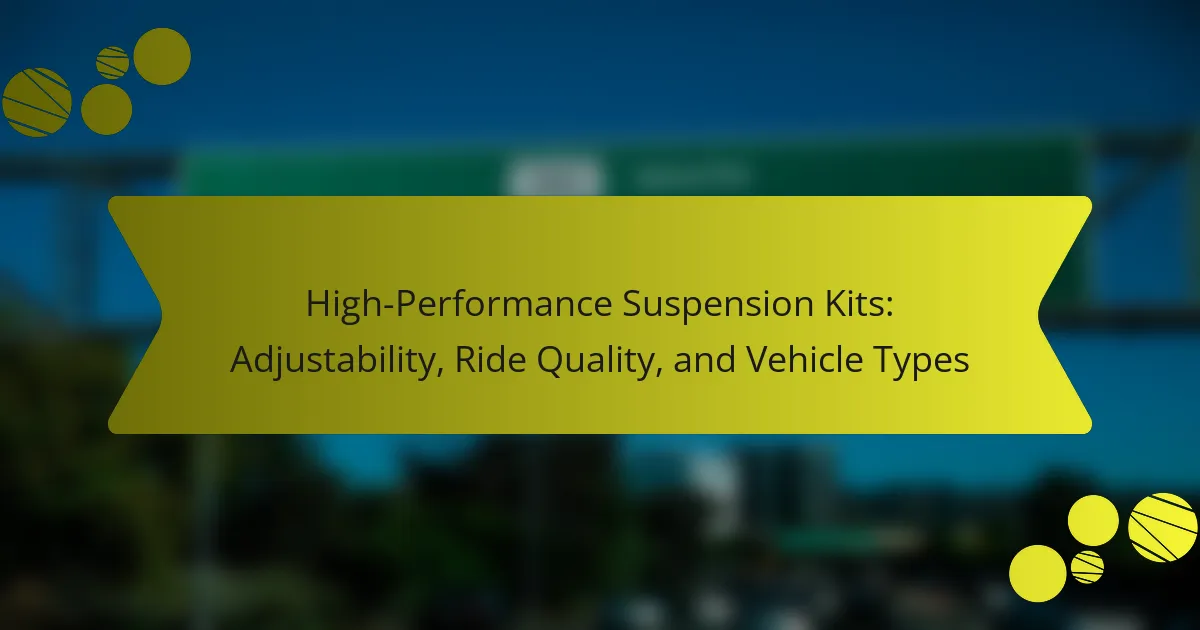High-performance air filters enhance engine efficiency and longevity by improving airflow and filtration. They increase horsepower and torque while reducing contaminants. These filters utilize advanced materials for superior dirt-holding capacity and durability. Understanding their benefits and selecting the right filter can lead to better vehicle performance and reduced maintenance costs.
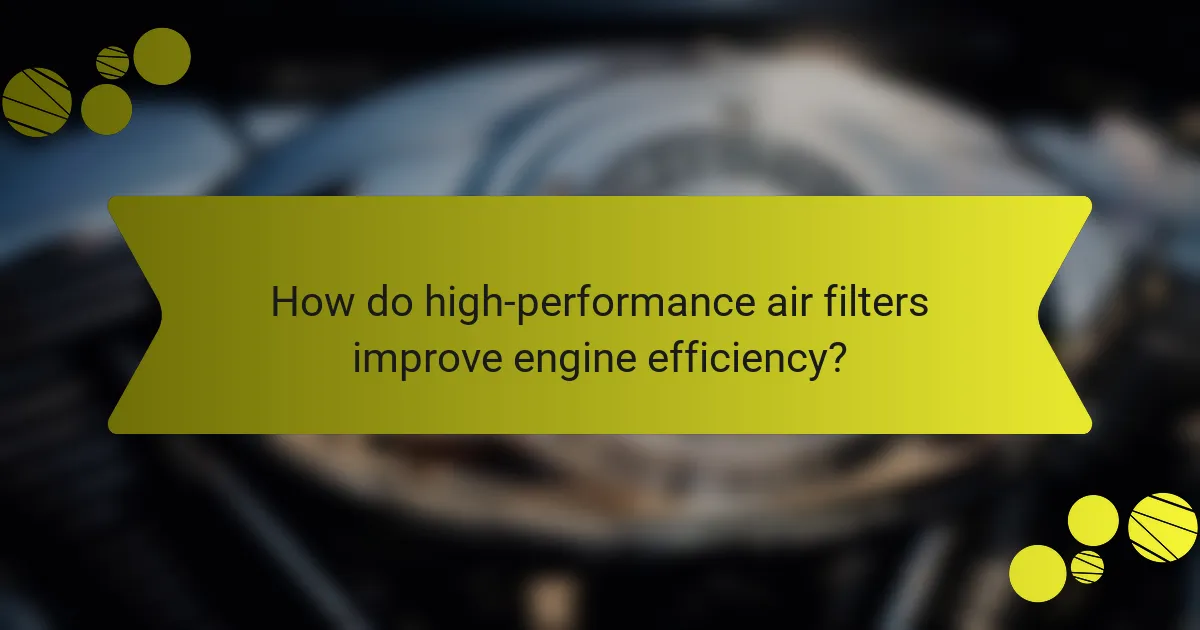
How do high-performance air filters improve engine efficiency?
High-performance air filters significantly enhance engine efficiency by improving airflow and filtration. They increase horsepower and torque while ensuring optimal combustion. Superior filtration reduces contaminants, extending engine longevity and reducing maintenance costs. As a result, vehicles equipped with these filters often experience better fuel economy and performance.
What are the benefits of using high-performance air filters?
High-performance air filters significantly enhance engine efficiency and longevity by improving airflow and filtration. They increase horsepower by allowing the engine to breathe more freely, resulting in better performance. Additionally, these filters reduce engine wear by capturing more contaminants, leading to prolonged engine life. Their design often features higher filtration capabilities and durability compared to standard filters, ensuring optimal engine function over time.
How does airflow impact engine performance?
Airflow significantly affects engine performance by optimizing combustion efficiency. High-performance air filters enhance airflow, leading to better engine efficiency and longevity. These filters improve filtration, reduce engine wear, and increase horsepower. For example, a high-performance air filter can increase airflow by up to 25%, resulting in noticeable performance gains. Enhanced airflow ensures the engine receives the necessary oxygen for optimal combustion, which is crucial for power generation.
What role do air filters play in fuel efficiency?
High-performance air filters significantly enhance engine efficiency and longevity by improving airflow and filtration. They reduce engine strain, leading to better fuel combustion and increased fuel efficiency. For example, a high-performance air filter can improve airflow by up to 20%, resulting in a noticeable boost in miles per gallon. Additionally, these filters often have a longer lifespan than standard filters, reducing replacement frequency and maintenance costs. As a result, investing in high-performance air filters is beneficial for both performance and economy.
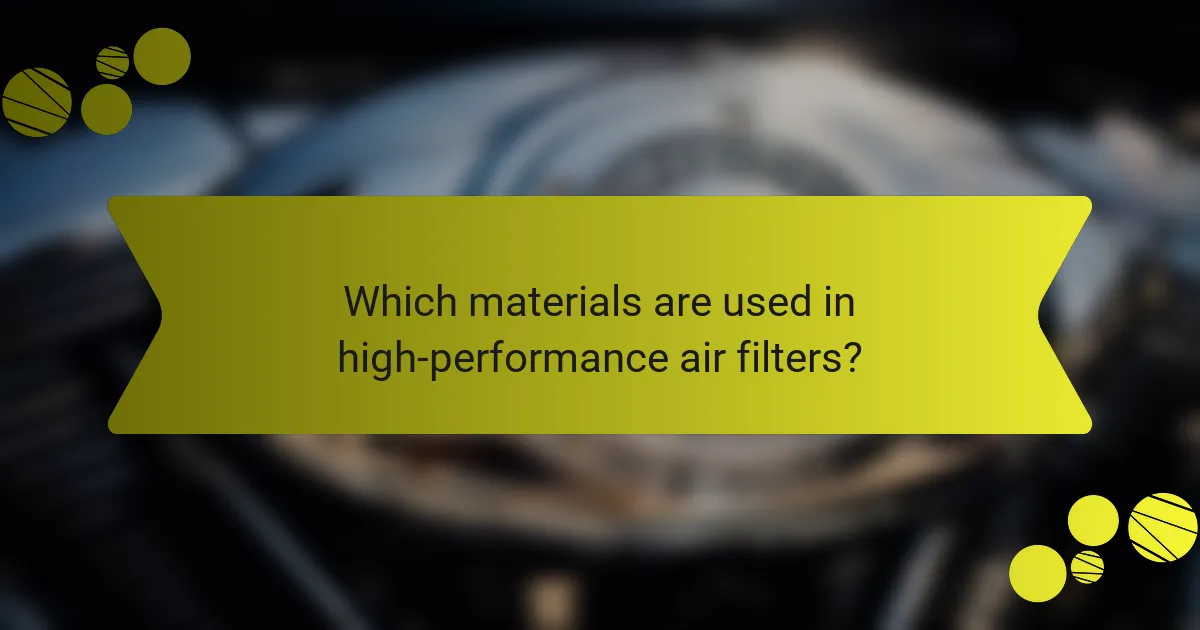
Which materials are used in high-performance air filters?
High-performance air filters typically use materials like synthetic fibers, foam, and pleated paper. These materials enhance filtration efficiency and engine longevity. Synthetic fibers provide superior dirt-holding capacity, while foam offers flexibility and durability. Pleated paper, often treated for moisture resistance, balances airflow and filtration.
How do synthetic filters compare to traditional paper filters?
Synthetic filters generally outperform traditional paper filters in engine efficiency and longevity. Synthetic filters provide better filtration, allowing for improved airflow and enhanced engine performance. They often have a longer lifespan, requiring less frequent replacement, which can reduce maintenance costs. Additionally, synthetic filters can capture smaller particles compared to paper filters, contributing to cleaner engine operation and increased fuel efficiency.
What are the advantages of using foam air filters?
Foam air filters offer significant advantages, enhancing engine efficiency and prolonging engine life. They provide superior filtration, trapping more dirt and debris compared to traditional filters. This leads to improved airflow, resulting in better combustion and increased power output. Additionally, foam filters are washable and reusable, reducing waste and long-term costs. Their lightweight design contributes to overall vehicle performance, making them a popular choice among automotive enthusiasts.
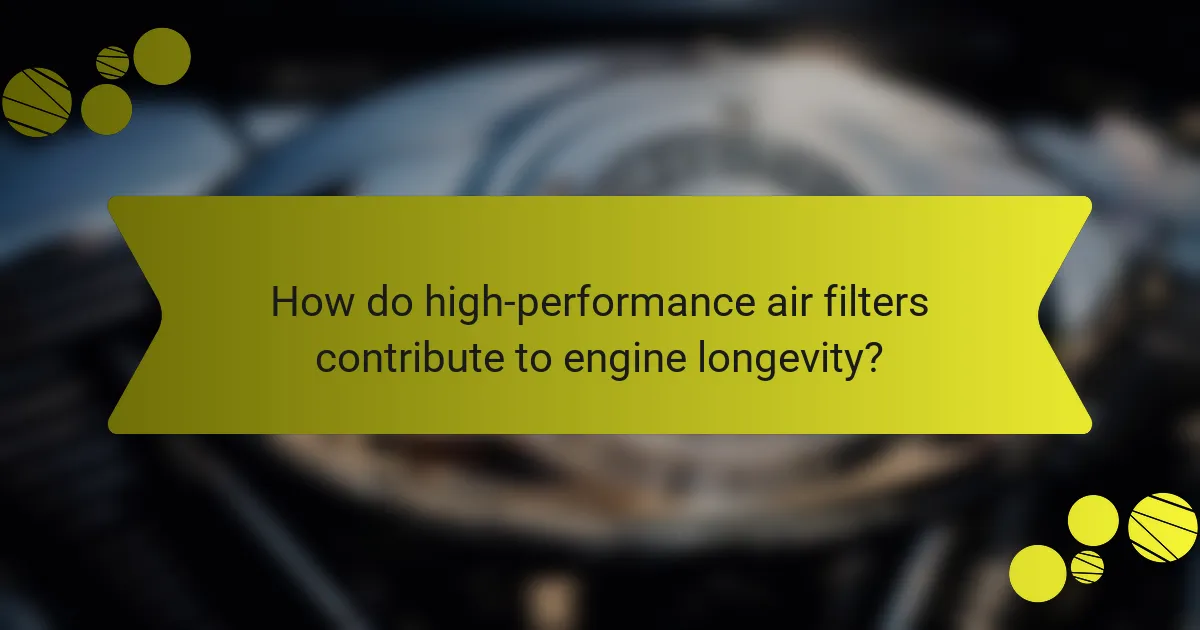
How do high-performance air filters contribute to engine longevity?
High-performance air filters significantly enhance engine longevity by improving airflow and filtration efficiency. They reduce contaminants entering the engine, which minimizes wear on internal components. This leads to better combustion and optimal performance, ultimately extending the engine’s lifespan. Additionally, high-performance filters often have a longer service life than standard filters, requiring less frequent replacements. By maintaining cleaner air intake, these filters contribute to overall engine health and efficiency.
What maintenance practices enhance the lifespan of air filters?
Regular maintenance practices significantly enhance the lifespan of high-performance air filters. Key practices include timely replacements, regular cleaning, and ensuring proper installation.
1. Replace air filters according to manufacturer recommendations, typically every 12,000 to 15,000 miles.
2. Clean reusable filters with appropriate cleaning solutions to remove debris and contaminants.
3. Inspect filters during routine vehicle maintenance to identify any signs of wear or damage.
4. Ensure correct installation to avoid air leaks that can reduce filter efficiency.
These practices help maintain optimal engine efficiency and prolong the longevity of air filters.
Which factors affect the durability of air filters?
Several factors affect the durability of air filters, including material quality, maintenance frequency, environmental conditions, and filter design. High-quality materials enhance longevity, while regular maintenance prevents clogging. Harsh environments can accelerate wear, and innovative designs improve airflow and filtration efficiency.
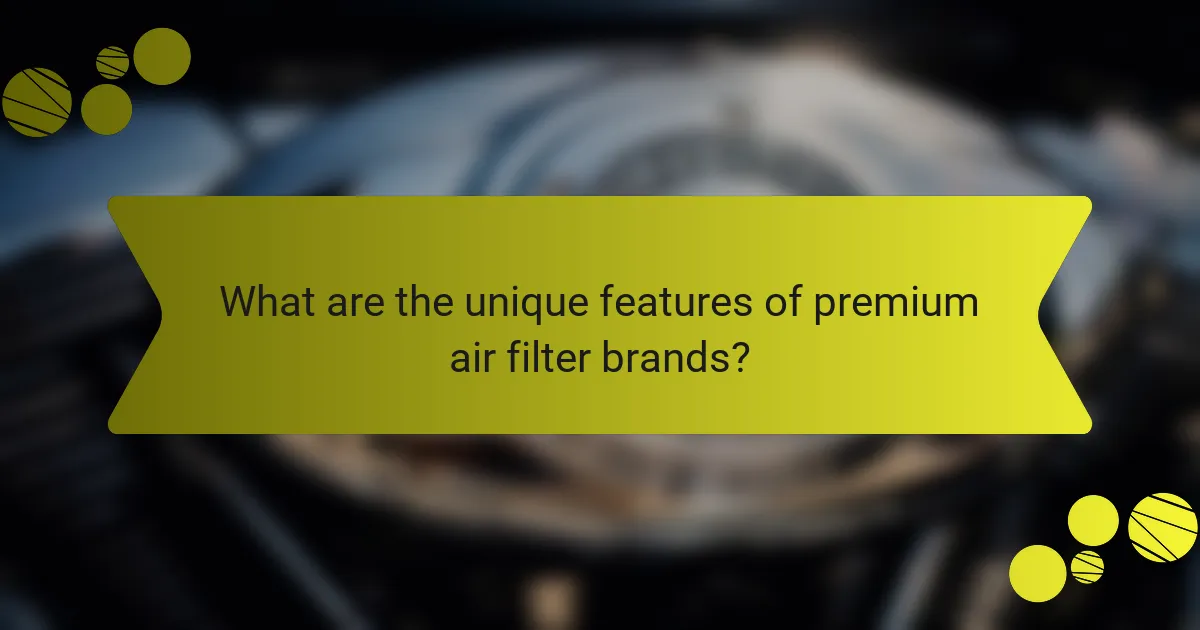
What are the unique features of premium air filter brands?
Premium air filter brands offer unique features that significantly enhance engine performance and longevity. These filters typically utilize advanced filtration technologies, such as multi-layered media, that improve air flow while trapping more contaminants.
High-quality materials contribute to durability and reliability, ensuring consistent performance over time. Additionally, some brands incorporate specialized coatings that resist moisture and prevent mold growth, further protecting the engine.
Another unique feature is the precision engineering of these filters, which guarantees a perfect fit for various vehicle models, minimizing installation issues. Premium air filters often come with longer service intervals, reducing maintenance frequency and costs.
Overall, these attributes collectively contribute to improved fuel efficiency and engine responsiveness, making premium air filters a valuable investment for vehicle owners.
How do specific brands differentiate their air filter technology?
Brands differentiate their air filter technology through unique designs, materials, and filtration efficiency. For example, some brands utilize multi-layer filtration systems that enhance dust and particle capture, resulting in improved engine performance. Others may focus on using advanced synthetic materials that offer longer lifespan and better airflow. Additionally, proprietary technologies, such as electrostatic filtration, can set brands apart by increasing the filter’s ability to trap smaller particles. These innovations contribute to enhanced engine efficiency and longevity, making specific brands stand out in a competitive market.
What innovations are being introduced in air filter design?
High-performance air filters are incorporating advanced materials, smart technology, and enhanced filtration techniques to improve engine efficiency and longevity. Innovations include the use of synthetic fibers for better dirt retention and airflow, as well as sensors that monitor filter condition in real-time. These developments lead to increased engine performance and reduced maintenance needs. Additionally, some filters now feature eco-friendly designs, promoting sustainability while maintaining high efficiency.
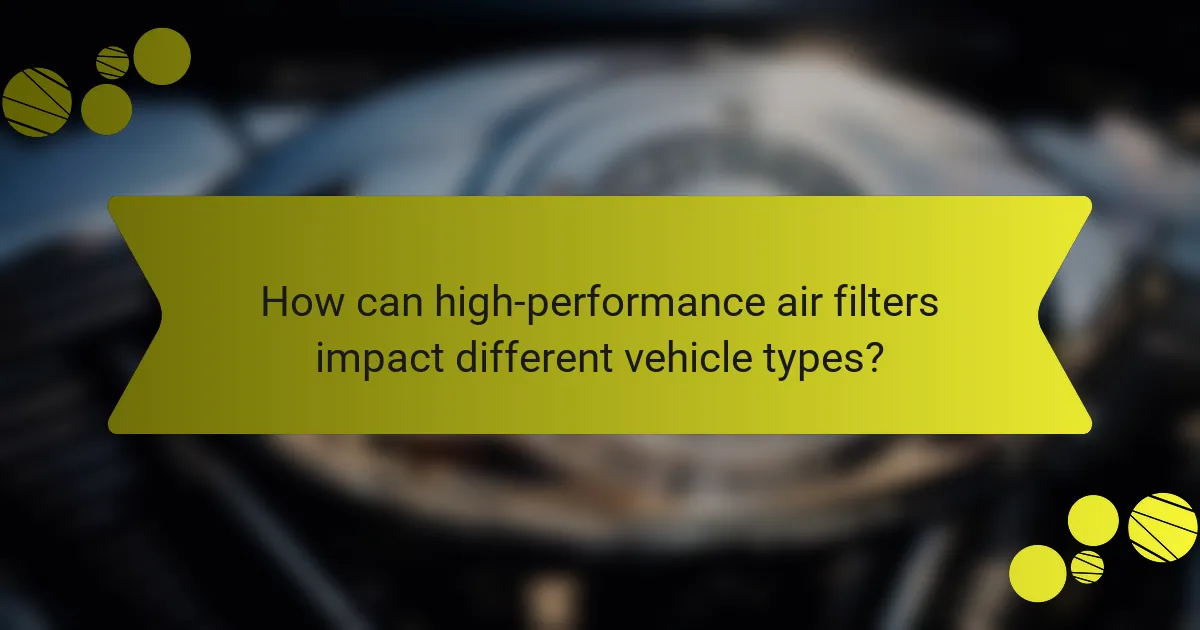
How can high-performance air filters impact different vehicle types?
High-performance air filters significantly enhance engine efficiency and longevity across various vehicle types. They improve airflow, reduce engine strain, and increase fuel efficiency.
For sports cars, high-performance air filters can boost horsepower by optimizing air intake. In trucks, they enhance torque and towing capacity, making them more effective for heavy loads. For SUVs, these filters improve overall engine responsiveness and fuel economy, contributing to better off-road performance.
Additionally, high-performance air filters can extend engine life by preventing contaminants from entering the engine, which is crucial for all vehicle types. This longevity is particularly beneficial for vehicles used in demanding conditions.
In summary, high-performance air filters provide tailored benefits that enhance performance and durability, making them a valuable upgrade for any vehicle.
What are the considerations for high-performance air filters in sports cars?
High-performance air filters significantly enhance engine efficiency and longevity in sports cars. Key considerations include filtration efficiency, airflow capacity, and durability.
Filtration efficiency determines how effectively the filter removes contaminants, impacting engine performance. Airflow capacity ensures optimal air intake, crucial for high-revving engines. Durability is essential, as filters must withstand extreme conditions without degrading.
Selecting the right material, such as synthetic fibers or cotton, can further improve performance. Additionally, maintenance frequency affects filter lifespan; regular cleaning or replacement is necessary to sustain benefits.
How do air filters affect diesel engines compared to gasoline engines?
High-performance air filters enhance diesel engines more significantly than gasoline engines due to their unique airflow requirements. Diesel engines benefit from improved filtration and increased airflow, resulting in better combustion efficiency and reduced emissions. Gasoline engines, while also benefiting, typically do not experience as dramatic an effect. Diesel engines often operate under higher stress, making effective air filtration crucial for longevity. Enhanced air filters can lead to a 5-10% increase in power output for diesel engines, illustrating their unique attribute of maximizing engine performance under load.
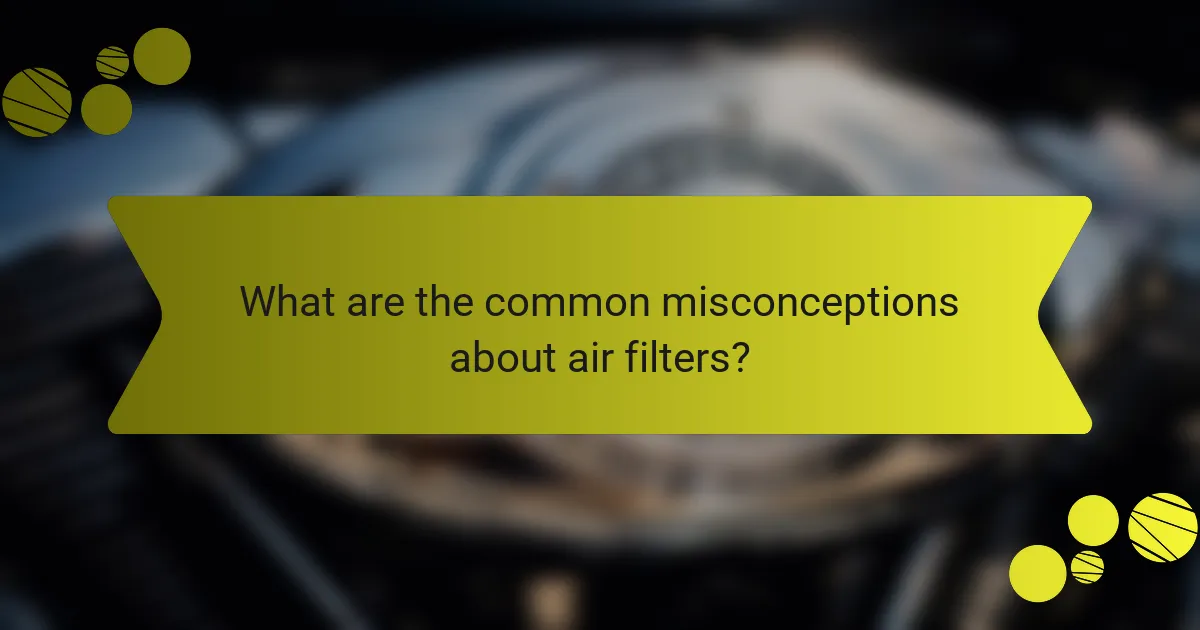
What are the common misconceptions about air filters?
Many misconceptions exist about high-performance air filters, primarily regarding their effectiveness and maintenance. Some believe these filters require excessive maintenance, while in reality, they often last longer than standard filters. Another common myth is that they significantly reduce airflow; however, high-performance filters are designed to enhance airflow without compromising filtration. Additionally, some users think that all air filters are the same, but high-performance options are specifically engineered to improve engine efficiency and longevity. Understanding these misconceptions can lead to better maintenance practices and improved vehicle performance.
Why do some believe that all air filters are the same?
Some believe all air filters are the same due to a lack of awareness about performance differences. High-performance air filters enhance engine efficiency and longevity by improving airflow and filtration. Standard filters may restrict airflow, reducing power and fuel efficiency. High-performance options often utilize advanced materials that trap smaller particles, contributing to better engine protection. Understanding these distinctions is crucial for maintaining optimal vehicle performance.
What myths exist regarding the maintenance of air filters?
Many myths surround air filter maintenance, leading to misconceptions. One common myth is that all air filters last the same duration, but high-performance filters often require less frequent changes due to superior filtration. Another myth suggests that cleaning air filters is always effective; however, some filters are designed for single use and cleaning can damage them. Additionally, people believe that a dirty filter does not impact engine performance, but it can significantly reduce efficiency and longevity. Lastly, some assume that any air filter will suffice for any engine type, but specific filters are engineered for optimal performance in particular vehicles.
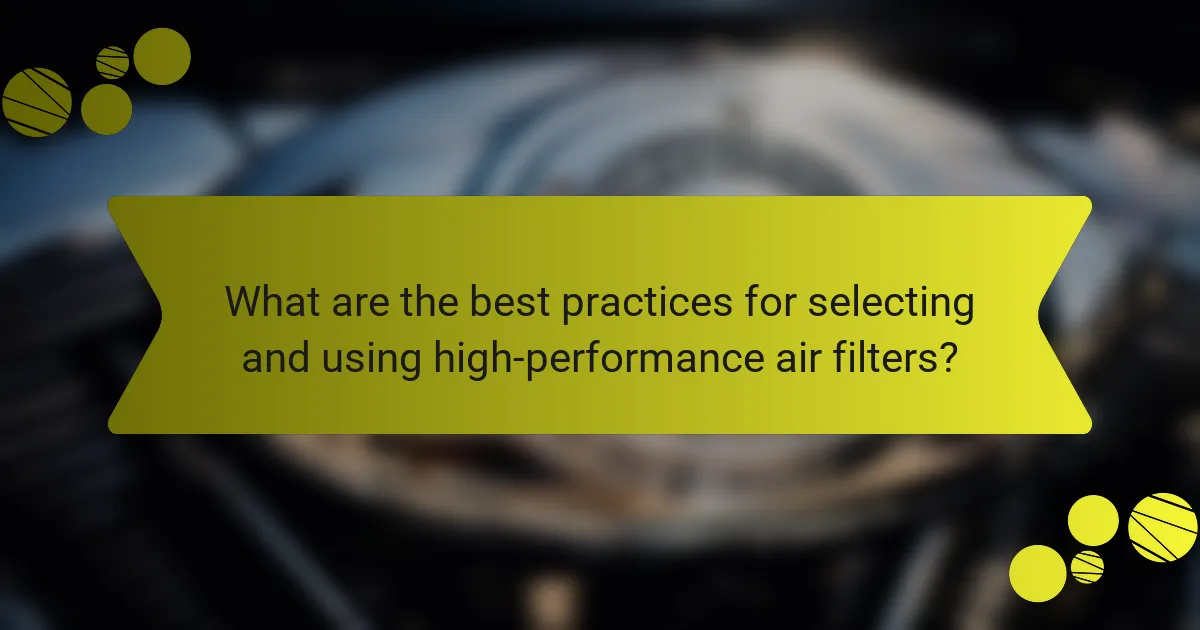
What are the best practices for selecting and using high-performance air filters?
Select high-performance air filters based on efficiency ratings, material quality, and compatibility with your engine. Consider filters with high dust-holding capacity for longer use. Use filters designed for your vehicle’s specifications to enhance engine performance and longevity. Regularly replace filters to maintain optimal airflow and filtration efficiency.
How should consumers evaluate air filter performance?
Consumers should evaluate air filter performance by considering air flow, filtration efficiency, and durability. High-performance air filters enhance engine efficiency, leading to improved fuel economy and longer engine life. Key metrics include the filter’s MERV rating, which indicates its filtration capability, and the filter’s lifespan, often measured in miles or months. Additionally, consumers should assess compatibility with their vehicle’s engine type to ensure optimal performance. Regularly replacing filters maintains engine health and efficiency.
What common mistakes should be avoided when replacing air filters?
Common mistakes to avoid when replacing air filters include neglecting to check compatibility, failing to clean the surrounding area, and overlooking the recommended replacement interval. Using incorrect filters can hinder engine performance. Cleaning the area prevents debris from entering the engine. Following the manufacturer’s guidelines ensures optimal efficiency and longevity of high-performance air filters.
